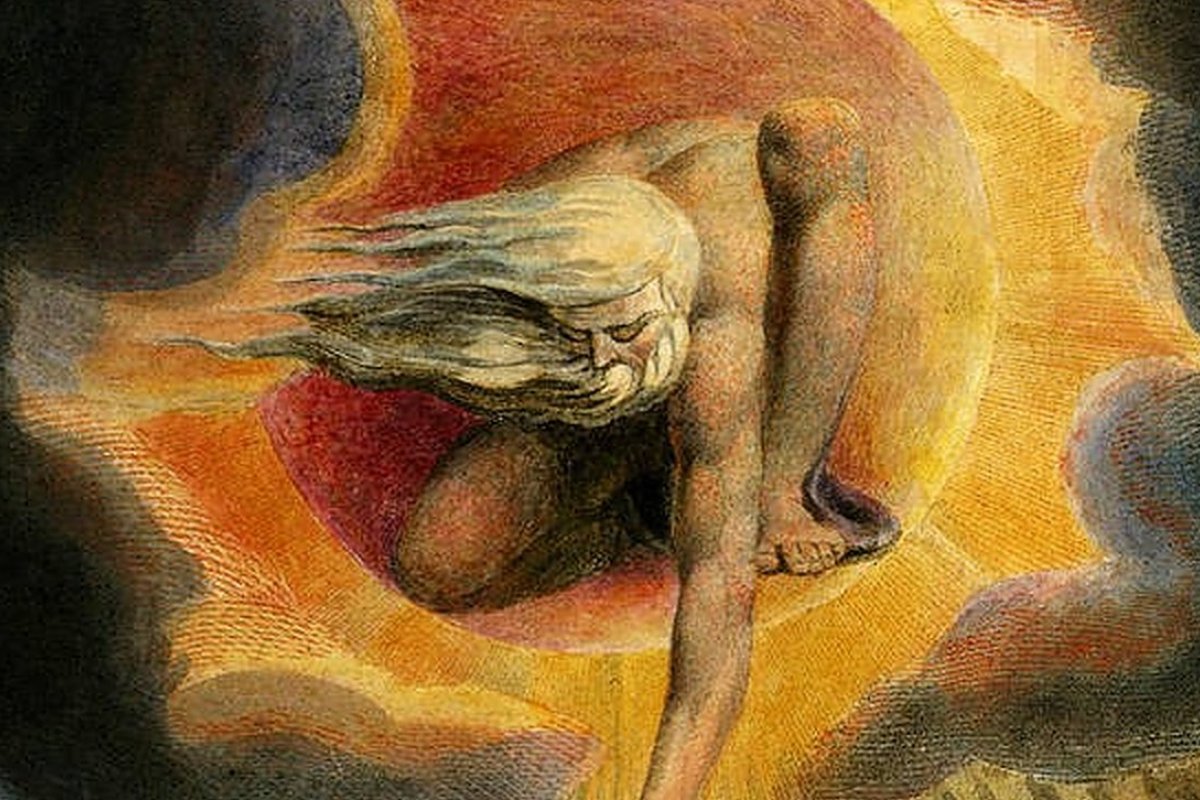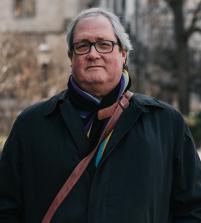
The Christian Who Was a Church of One
In a world that seems to me to offer precious little of the mantle of prophecy, I offer you William Blake.
The poet and engraver William Blake (1757–1827) is arguably the greatest literary misfit of modernity (in literary terms, neither neo-classicist nor Romantic, but of both ages; in theological terms, see below). I am teaching Blake this quarter, and there are pedagogical challenges to conveying his remarkable and coordinated artistic output as, from the same hand and mind, poet and engraver. You must see at once in two ways, reading and looking. Blake’s distinctive, even generous visionary mode presents an ongoing challenge, a fact modern technology (unknown to Blake, welcome for us) only underscores more acutely.
The bigger pedagogical question, though, is why I teach Blake. There are handy answers: he did what these days is sometimes termed “theopoetics,” one of the latest au courant terms that aim to vivify my field of religion, literature, and visual culture. Handy as it is, that’s hardly sufficient to Blake’s idiosyncrasies: it’s a plausible descriptor of a range of poets (going back in time from Blake to Chaucer’s pilgrims and Spenser’s allegories and all those metaphysicals, then forward to Hopkins and Stevens and Yeats). Plus, my students are rightly impatient with handy answers. And, truth be told, so am I.
I teach William Blake because he understood himself to be a prophet, and he was truly, madly, deeply without honor in his own country – England, the place he poeticized as “Albion” that in his imagination had long ago displaced ancient Atlantis and offered its vain and fallen nationhood as a tawdry replacement. I find all the time that people intuitively are intrigued and even want to like Blake; but the Blake they find compelling is not this radical and lonely Christian prophet but the singsong lyricist of “Tyger, Tyger” and “Little lamb, who made thee?”
Blake wrote those lovely and loving lines, but if you look at them long enough, and all that surrounds them, you discover a more disconcerting vision. That tiger is a metonym of “fearful symmetry,” and no one is more cognizant than Blake that the lamb is ultimately to be slaughtered. So, Blake’s adopted Christian mantle is not that of the evangelist but the prophet. His is a poetic universe where apocalypse always beckons, precisely because the conventional world – what Blake spat out as “the Ratio” – works very hard to convince us that our present state of civilization is axiomatically preferable to our natural state. Foreshadowing Karl Marx (absent Marx’s offhand formulation of religion as an “opiate”), Blake saw a close relation between the words “revelation” and “revolution.” To be serious about Christianity meant, for Blake, that you were suspicious of any and all authority.
Those authorities not incidentally included the Church, or what Blake termed, with decided disparagement, “religion.” He meant by that term not just the Church of England (or of Rome), but those – he had the Deists on his frontal lobe – who were quite certain that what they called “the religion of nature” or “the religion of reason” was the desirable and reassuring entity. Blake did not stop with religion. He was no shrinking violet: he castigated not just bishops and popes but John Locke’s epistemology and Sir Isaac Newton’s physics as full-fledged participants in “the Ratio,” and included for good measure the aesthetics of the most decorated and decorous English painter of his era, Sir Joshua Reynolds, as well as the mystical visions of Emanuel Swedenborg.
Blake wanted to stir things up because he thought the Christian revelation was meant to stir things up. The first step in doing so (after reading the Bible from stem to stern) was to liberate Imagination from the shackles of Reason. For Blake, this could make us fully human again, and thus much more approximately the creatures of God that we truly are. Another figure who vexed Blake even as he garnered greater sympathy was John Milton; in one of his best formulations, Blake lamented that Milton was of the Devil’s party but did not know it. What Blake meant was that in Paradise Lost Milton fully distinguished life in the Garden of Eden from life in the world after Adam and Eve had eaten the forbidden fruit. Blake thought this folly, unworthy both of God and of God’s creatures: the Christian fall was not some “fortunate” event but a necessary part of the divine plan and the wellspring for the ongoing worldly cycle of creation, sin, and resurrection. Blake saw that cycle everywhere: in history certainly (there was a direct line for him from the fourteenth-century peasants’ revolts to the revolutions in America and France) but also in human beings, in flowers and fruits and vegetables, in night turning to day and day turning to night. Imagination, Blake thought, was far more likely than human reason to make us alive to the ongoing testimony of creation and resurrection.
I don’t teach William Blake because I agree with him about all of this. I teach him because all of this is, in the best sense, food for thought: I am nourished by a declarative voice, not my own, which at once invites my agreement and however reluctantly leaves room for me to demur (all the while reminding me of the costs of each). First, the demurrers. The intellectual historian in me is able to note that for all his animus to Deism, Blake at least initially regarded the American Revolution as promising. So his politics were at odds with his theology. My aesthetic sensibility is dubious about treating reason and imagination as in opposition. The theologian in me doubts very much that there can be Christianity without community, much less without some place for reason.
Now the identifications. I teach William Blake because he reminds me – and I hope all his readers – that to wear the mantle of the prophet should not axiomatically mean that one must live with dishonor, at least among one’s readers and successors if not in one’s country. I read his verse and gaze at his engravings because they capture and enrapture me in spite of my dissent. I am reminded in the process that there is a place in my world for engaged critique – in Blake’s specific case, for asking the question of whether what a religion says it proclaims is in fact true to that religion itself. In a world that seems to me to offer precious little of the mantle of prophecy, I offer you William Blake.


